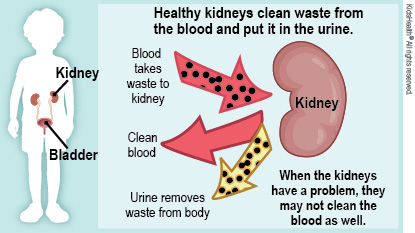Post-Streptococcal Glomerulonephritis (PSGN): How to Care for Your Child
Post-streptococcal glomerulonephritis (gluh-mare-you-low-neh-FRY-tis) is a kidney problem that sometimes happens after strep bacteria cause a throat or skin infection. Most kids with PSGN get completely better and do not have any long-term kidney problems.


Diet
Medicines
-
Give your child any prescribed medicines as directed by the medical team.
-
Check with the medical team before giving any other medicines to your child.
-
Don't give your child aspirin, ibuprofen, naproxen, or other nonsteroidal anti-inflammatory drugs (NSAIDs) unless the doctor says it's OK. They may harm the kidneys.
-
Some kids need to take vitamin supplements. Check with the medical team before giving any vitamins or supplements to your child.
Follow-Up

Your child:
-
does not start to feel better in 3‒7 days, or feels worse at any time
-
has nausea or throws up
-
has muscle weakness, spasms, or cramps
-
has headaches
-
has swelling of the face, belly, hands, or feet that gets worse
-
is peeing less than usual

Your child:

What happens in PSGN? Inside the kidneys are balls of tiny blood vessels called glomeruli. They clean the blood and remove waste and extra water, which leave the body in urine (pee). About 1‒3 weeks after some strep infections of the throat or skin, the glomeruli may get swollen and irritated. They stop working well, and blood cells and protein can leak into the pee. The kidneys also might not be able to get rid of some of the pee. When this happens, water can leak out of the blood vessels into the body's tissues. This causes swelling in the face, belly, hands, and feet.
How is PSGN treated? PSGN usually gets better on its own. Some kids might need treatment to avoid problems from the buildup of waste and water. Treatment may include changes to the diet, medicine and, in very rare cases, dialysis (a treatment to filter blood when the kidneys can't).